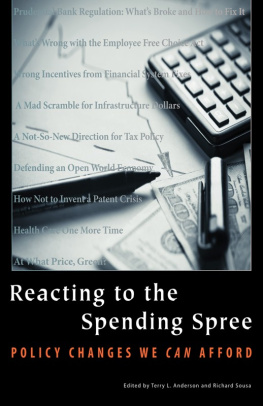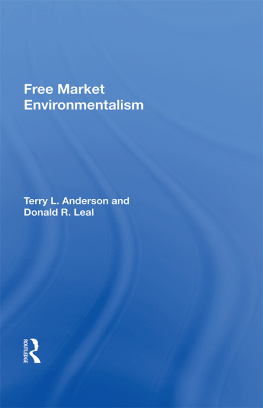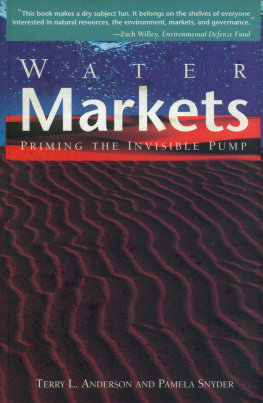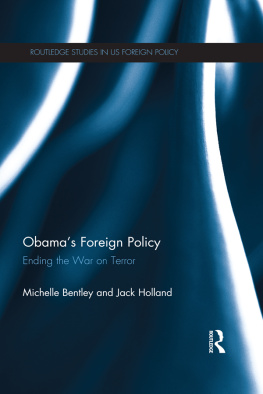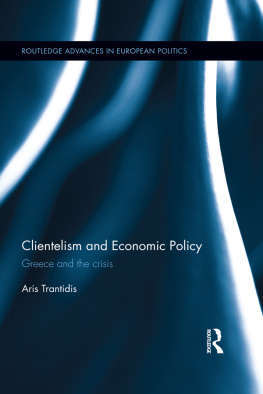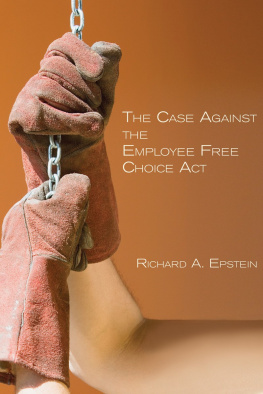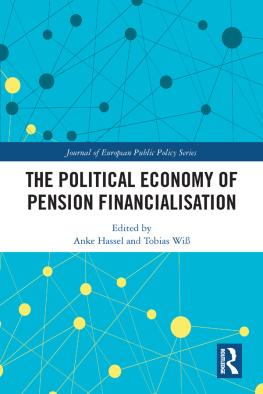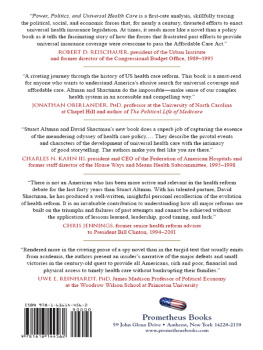HOOVER INSTITUTION TASK FORCE ON PROPERTY RIGHTS, FREEDOM, AND PROSPERITY
Reacting to the Spending Spree
POLICY CHANGES WE CAN AFFORD
EDITORS
Terry L. Anderson
Richard Sousa
CONTRIBUTORS
Terry L. Anderson
Jagdish Bhagwati
Charles W. Calomiris
Richard A. Epstein
Stephen H. Haber
Kevin A. Hassett
James L. Huffman
F. Scott Kieff
Gary D. Libecap
Henry E. Smith
HOOVER INSTITUTION PRESS
Stanford University, Stanford, California
The Hoover Institution on War, Revolution and Peace, founded at Stanford University in 1919 by Herbert Hoover, who went on to become the thirty-first president of the United States, is an interdisciplinary research center for advanced study on domestic and international affairs. The views expressed in its publications are entirely those of the authors and do not necessarily reflect the views of the staff, officers, or Board of Overseers of the Hoover Institution.
www.hoover.org
Hoover Institution Press Publication No. 575
Hoover Institution at Leland Stanford Junior University, Stanford, California, 94305-6010
Copyright 2009 by the Board of Trustees of the Leland Stanford Junior University
All rights reserved. No part of this publication may be reproduced, stored in a retrieval system, or transmitted in any form or by any means, electronic, mechanical, photocopying, recording, or otherwise, without written permission of the publisher and copyright holders.
First printing 2009
16 15 14 13 12 11 10 09 9 8 7 6 5 4 3 2 1
Manufactured in the United States of America
The paper used in this publication meets the minimum Requirements of the American National Standard for Information SciencesPermanence of Paper for Printed Library Materials, ANSI/NISO Z39.48-1992.

Library of Congress Cataloging-in-Publication Data
Reacting to the spending spree : policy changes we can afford/edited by Terry L. Anderson and Richard Sousa.
p. cm.
Includes bibliographical references and index.
ISBN 978-0-8179-3002-8 (pbk. : alk. paper)
1. Fiscal policyUnited States. 2. Financial crisesUnited StatesHistory21st century.
I. Anderson, Terry Lee, 1946 II. Sousa, Richard, 1949
HJ275.R27 2009
336.73dc22 2009019783
ISBN 978-0-8179-3003-5 (electronic)
Introduction
Terry L. Anderson and Richard Sousa
During the grueling campaign to win his party's nomination and the head-to-head competition with John McCain, candidate Barack Obama brought his message of hope and change to a country yearning for both. President Obama entered the White House with a set of challenges that no U.S. president in recent history has faced. He confronts an economic crisis of proportions unthinkable just a few short months before, unpopular wars in Iraq and Afghanistan, diminished loyalty among longtime international allies, the continued threat of terrorism, and a populous questioning the ability of all branches of government to govern and doubting the efficacy of markets. Add to all of this the massive bailout and stimulus packages, a burgeoning national debt, political partisanship at its height, climate change, aging infrastructure, skyrocketing health-care costs, and failing schools, and the list seems to include everything but curing the common cold.
The question is whether the momentum of the president's campaign, election, and inauguration is enough to implement the changes necessary to meet the hopes and expectations of the American citizens.
The president has said repeatedly that his highest priority is solving the county's economic problemsgetting people back to work, stabilizing financial markets, freeing up frozen credit markets, and, in general, rebuilding confidence in the U.S. economy. But he acknowledges that improving the economy is not the only problem. His solution to the economic crisis, and all the other problems, is a massive spending spree unprecedented in U.S. history.
Typically, little is accomplished in a presidential administration's first hundred days, but many are looking at the hundred-day mark as the first milestone for the Obama administration. The path followed since January 20 should foreshadow President Obama's direction for the rest of his presidency. That path clearly calls for a greater role for the government in the economy at the industry, firm, and individual levels.
No one would argue that the economy has not faltered, but it does not follow that the cause is the failure of the fundamental principles on which the U.S. economy is built. Those principles, which underpin our market system, are free markets, an open economy, free trade, the rule of law, and well-defined and uniformly enforced property rights.
The Hoover Institution's Task Force on Property Rights, Freedom, and Prosperity was established in late 2008 to study those principles in the context of historical and contemporary examples and to promote meaningful dialogue about their effectiveness. The task force's eleven members fully embrace the goal of examining the role of government in providing a stable legal system for protecting property rights and encouraging economic growth while promoting individual responsibility and liberty.
When the task force met in early March 2009, the magnitude of the issues facing the Obama administration was becoming increasingly clear. Because the members of the task force felt their expertise could shed light on how those issues could be handled without spilling as much governmental red ink, they decided to write this book. Eight members of the task force (three could not participate due to other commitments) and two outside experts wrote chapters analyzing the Obama administration's approach to a wide range of public policies.
To be clear, this is not a book solely about the first hundred days of the Obama presidency; it is a book about how a stable rule of law, secure property rights, and an open economy provide the foundation on which the administration can build more effective policies in the next 1,300 days. The consistent theme of this book is that we should not abandon the principles that have served us so well throughout our history. We should not make decisions now, based on the political expediency of action, polling, and special-interest pressures, that will have long-run ill effectswhether anticipated or not.
From the name of the task force one can correctly infer that it is populated with economists and legal experts who study the evolution of property rights, their protection, and their importance to economic growth. This team of scholars tackled a subset of policy issues to which their expertise applied; doing more would have required a much larger team and would have resulted in a longer, inaccessible tome. The intent of the coverage here is to provide a lens through which other policy issues can be examined. Some chapters offer prescriptions to President Obama and suggest specific solutions to the problems his administration is facing. Others are more general and wide sweeping, offering counsel based on sound economic principles and clear-thinking incentive schemes.
The policy analyses and recommendations in this book are not meant to criticize without being constructive, but are meant to offer alternative approaches and guidance on how to avoid pitfalls. Because the economy has received so much attention from the Obama administration, the lead chapters examine the incentives, good and bad, found in the proposed financial fixes. The first three chapters suggest regulatory reforms for the banking sector and analyze President Obama's tax policies. The chapters that follow analyze narrower policy issuespatents, global warming, green jobs, labor, health care, and infrastructure investment. The book concludes with a discussion of the important interface between the Obama administration's policies and the global economy, especially as those policies may discourage trade and growth through protectionism. That chapter appropriately asks whether President Obama's leadership and charisma can prevent the United States from following a path of protectionism that will not only harm the U.S. economy but slow the world's path to economic recovery.



